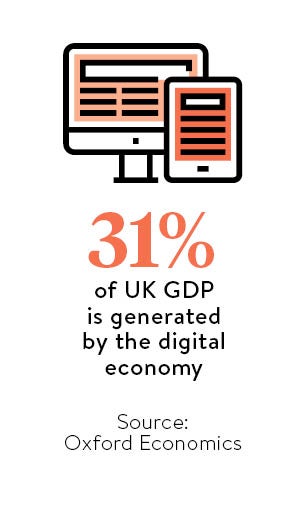 E-commerce is booming as retailers, banks, insurers and the travel industry ramp up their digital sales. But while consumer markets have reaped the benefits of digital technology, there are still significant areas of the economy that are lagging in the race to digitisation. Business consultants say manufacturing and industrial sectors are yet to make concerted moves into the world of data-driven technology.
E-commerce is booming as retailers, banks, insurers and the travel industry ramp up their digital sales. But while consumer markets have reaped the benefits of digital technology, there are still significant areas of the economy that are lagging in the race to digitisation. Business consultants say manufacturing and industrial sectors are yet to make concerted moves into the world of data-driven technology.
Over the coming years, the next stage of the digital revolution will unfold with artificial intelligence, machine-learning and robotics fuelling industrial development. To succeed during this phase, organisations will need to find new ways of working with technology and to identify areas of their business that lend themselves to transformation.
The UK is already the second most advanced digital nation in the world after the United States, according to new research from consultancy Accenture in association with Oxford Economics. They calculate that the digital economy accounts for about 31 per cent of the UK’s gross domestic product, outstripping Australia, Canada, France and Germany. The US leads the world, with digital activity accounting for 33 per cent of its GDP.
Business services, insurance and banking are the top three UK sectors with the biggest share of digital output, according to the research. A further £58 billion will be added to UK GDP by 2020 if digital growth continues to increase.
Businesses are looking at the strategies they need to harness technology and create the next generation of digital innovations. This will require a mixture of a skilled workforce, investment and the right management approaches.
Business challenges
However, many companies face significant challenges in their attempts to adopt the latest technology and overlay it on systems they already have in place. As Paul Thompson, head of Deloitte Digital for Europe, the Middle East and Africa (EMEA), says: “One of the challenges people face is how do I keep some of my core systems and operations going which I’ve invested in heavily in the past which are not as agile as current technologies? How do I keep those going at the same time as taking advantage of things advanced by newer technology?”
The UK is already the second most advanced digital nation in the world after the United States
For instance, retailers need to offer online sales while their supply chains and stock management systems might be quite old, much less flexible and less agile than e-commerce.
“Organisations are going to have to work in multimodal ways,” says Mr Thompson. “They are going to have to work in many different ways, to be very agile and fleet of foot in adopting these new ways of working.”
Meanwhile, Rowan Scranage, vice president for EMEA at database operator Couchbase, warns that the speed of technological change threatens to leave some businesses behind. Some struggle to understand what is the most appropriate technology to use, given the wide selection of competing offers. “Pace of innovation is actually confusing for the market,” he says.
The other challenge for businesses operating in the digital economy is to make sure they are at the forefront of developments, rather than simply reacting to the latest innovations from rivals. Nick Taylor, managing director for UK and Ireland at Accenture Strategy, says companies need to move on from simply identifying disruptive technologies which threaten their business and responding to them. “There’s a tiredness and weariness around that agenda,” he says. “It is a very reactive way of looking at the competition.”
Successful digital strategies
Disruption is often tangential and nibbles away at different parts of a business, such as payments, deliveries, aftercare or products. But simply seeking to protect the business from outside threats puts the company on the back foot. Far better is to be proactive and create the innovations that will change the way business is done.
This may involve setting up an external innovation unit which conceptualises and tests out innovations. These units are kept at arm’s length from the main company in case there is an “allergic reaction” within the business to the innovations, where executives react against the innovation as it is seen as competing with their activities. But a potential problem with innovation units is the danger of creating “ivory towers” which come up with lots of ideas and proofs of concept, but fail to create lasting innovations.
The most successful approach, says Mr Taylor, is when companies analyse business problems and find ways to fix them. Many of the most successful Silicon Valley companies use technology to solve a single problem and others should mirror this approach. “They start off with the premise that we are solving a problem, will be ruthlessly focused on solving the problem and the outcome will be measured on the solution, rather than governance within the organisation,” he says.
This could involve finding a new way of delivering goods or helping customers choose the right product. The important factor is to identify a problem that is holding back revenues and then use technology to find a way around it.
Businesses are only too aware of the importance of implementing digital technology. The most important factors for success will be to change management approaches and adopt agile, flexible ways of working with new technology, and to have access to a skilled and technology-savvy workforce. If these conditions are met, digital’s contribution to the UK economy is set to rise.

